For millennia mankind has been vexed by the need to reconcile our physical and metaphysical existences. While our mental capacity and ability to reason allowed for the evolution of man into the most dominant animal on the planet it also forced us to question the nature of our existence and the purpose of our lives. One of the most important figures in the quest to determine the meaning of man’s existence and resolve the disparity between man as physical animal and man as intellectual being is René Descartes.
Born in France in 1596 Descartes came at a pivotal time in history as the advent of a scientific view of the world was forcing a drastic rethink of the natural order of the world. Before this point it had been argued that the world had been made as it appeared and that the truest source of knowledge came from our senses. With Nicolaus Copernicus’ mathematical model of a heliocentric galaxy proving that the earth orbited the sun and not vice versa the infallibility of our senses was shattered. -Jan Matejko; Astronomer Copernicus, or Conversations with God
-Jan Matejko; Astronomer Copernicus, or Conversations with God
By the 17th century the world was in the full throes of the Copernican Revolution and many, if not all, of the assertions supported by established doctrine were open to scrutiny. As he developed as a scientist and mathematician Descartes’ world view became ever more influenced by the idea that empirical knowledge is not undeniable. Not content with questioning parts of our knowledge system Descartes attacked the whole, challenging every assumption about what we can know and how we can know it.
While it might seem unreasonable to question the assertion that fire burns or that water is wet Descartes wonders: ‘what if I am being deceived by some great devil?’ A more modern version of this conundrum is ‘how do I know I’m not just a brain in a vat and that the world is merely a false simulation?’ While it might seem farfetched and unreasonable, this thought experiment is logically sound and vitally important in a world whose every entrenched value and belief is under siege.
Even mathematics and Aristotelian logic aren’t safe from Descartes scrutiny. How can we know that 2+2=4 or that ‘every bachelor is an unmarried man’ if our entire existence is being manipulated by an external force? In the absence of an all illuminating red pill the only truth we can wholly know, deduced Descartes, is that we exist and that we are a thinking thing. Even if all of our thoughts are false and the world around us an illusion the simple act of thinking that we might not be able to think proves that there is something that is thinking. In this way Descartes established what many view as the only wholly infallible fact about existence: cogito ergo sum, or ‘I think therefore I am’.
Though this argument, or variations on this argument, existed in ancient Greece and India its appearance in Descartes Discourse on Method,published in 1637, is seen by many as the starting point of modern philosophy. Forcibly removing all pre-existing assumptions and notions Descartes set out in his philosophical work to discover the limitations of human understanding and knowledge. This remains a large part of philosophical discussion today as arguments still abound in colleges, family homes, artsy coffee houses, and other locations around the world about what we can know and how we can know it.
Though Descartes’ work reached far beyond this one assertion, cogito ergo sum would shadow the rest of his work; as it would haunt every subsequent philosopher. Having called into question all evidence gleaned from our senses Descartes must rebuild the world from the cornerstone of thinking and existing. While it is simple enough to re-establish innate knowledge from this point, that 1+1=2 or that ever bachelor is a single man, it is much harder to rebuild the world we experience through our fallible senses.
Descartes never truly reconciles the outward world with his intense doubting. In the end he was forced to rely on the existence of a benevolent God to allow any true knowing of observed facts; though he insists that we still must be ever sceptical of our perceptions. This set in motion, or at least helped to hasten, the split between the rationalists, who agreed with Descartes’ doubting of the senses, and the empiricists, who emphasise the importance of experience and evidence gathered through our senses.
Another issue thrown up by Descartes’ rationalism and doubting of the senses was the separation of the mechanical body and the incorporeal mind. With the human being split so decisively between the vehicle of physical interaction and the non-physical thoughts which guide the body yet are free from the constraints on it, Descartes’ had to figure out a way to reconcile the two aspects of man interacting with each other.
Like other philosophers who attempted to divide man into separate parts, Descartes failed to give a reasonable account of how these two opposites would interact. Despite his failings, however, Descartes is still one of the greatest thinkers to exist. His influence is still keenly felt today in the way we think and argue, among philosophers both amateur and professional, and he truly does deserve his title The Father of Modern Philosophy.
Listen back as Patrick and a panel of experts look back at the life and legacy of René Descartes. Learn about the life behind the thinker and how independent the thought of this international traveller and scholar truly was. Listen in as we discuss his groundbreaking work in the fields of philosophy, mathematics, geometry, and science. Find out about the impact Descartes’ genius had on the world during his own short lifetime and ever since.









